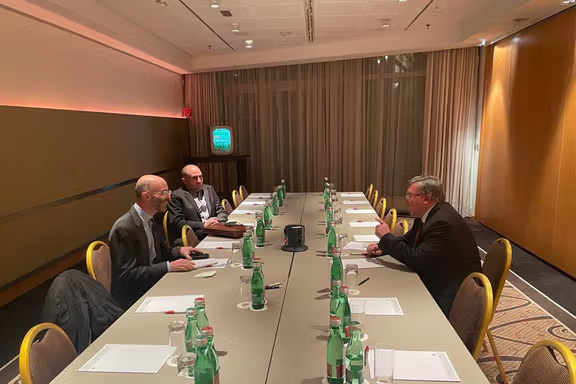Malley: US Focus Not Nuclear But ‘What Is Happening In Iran’

Remarks from United States special Iran envoy Rob Malley Monday signaled Washington no longer sees Iran’s nuclear program as separable from other issues.

Remarks from United States special Iran envoy Rob Malley Monday signaled Washington no longer sees Iran’s nuclear program as separable from other issues.
Speaking to reporters in Paris, Malley appeared to jettison the logic of the 2015 Iran nuclear agreement, which restricted Tehran’s atomic program in return for the easing of international sanctions. Eighteen-month talks to revive the agreement, from which former president Trump withdrew the US in 2018, have come to naught.
“Our focus is not an accord that isn’t moving forward, but what is happening in Iran ... this popular movement and the brutal crackdown of the regime against protesters,” Malley said. “It’s the sale of armed drones by Iran to Russia ... and the liberation of our hostages…” At least three American nationals are detained in Iran, with talks for a prisoner swap inconclusive.
Malley reiterated Washington’s view that the talks to revive the 2015 agreement, the JCPOA (Joint Comprehensive Plan of Action), had floundered because of both “Iran’s position,” in making demands the US considers beyond the JCPOA, and “everything that has happened since [September].” Recent protests in Iran followed the September 16 death of Mahsa Amini after detention by Tehran ‘morality police.’
President Joe Biden came to office in 2021 committed to reviving the JCPOA as a non-proliferation agreement and thereby lifting the ‘maximum pressure’ sanctions introduced by Trump. But Biden’s administration has extended sanctions, citing both Tehran’s military links with Russia and its treatment of protestors.

Since 2019, the year after the US left the JCPOA, Iran has in response gradually extended its nuclear program and according to the latest report from the International Atomic Energy Agency (IAEA) has now 3,674kg of enriched uranium. This is far above the 267kg JCPOA limit, and includes 62kg enriched to 60 percent, a short step from the 90 percent considered ‘weapons grade.’
Under the JCPOA Iran enriched only to 3.67 percent. Under the JCPOA it employed only 6,104 first-generation centrifuges whereas it now additionally uses at least 4,000 more advanced centrifuges that were banned under the 2015 agreement.
‘No magic…new formula’
Malley said Monday the US would discuss with its “European allies” what steps to take should Iran continue to expand nuclear activities. “If Iran takes the initiative to cross new thresholds in its nuclear program, then obviously the response will be different and coordinated with our European allies…There is no magic in which we will find a new formula.”
With Benjamin Netanyahu set to return to office and the outgoing Israeli administration suggesting it had thoroughly prepared for a military attack on Iran, both the United Arab Emirates (UAE) and Saudi Arabia show concern over rising tensions. While Central Intelligence Agency director William Burns Monday met the head of Russian foreign intelligence Sergey Naryshkin in Ankara to discuss ‘risk management,’ there has been speculation that Moscow has decided to supply Iran with Su-35 fighter jets.
Anwar Gargash, diplomatic adviser to UAE President Mohamed bin Zayed Al Nahyan, said Monday the Emirates had no interest in “choosing sides” between competing powers. Gargash said that while the UAE wanted “codified and unambivalent commitments” from the US, it hoped to see effort put into easing strains and encouraging economic growth without relying on “just one or two countries.”
Both the UAE and Saudi Arabia are expanding trade with China, while Riyadh has led coordination through Opec+ with Russia over oil production levels. The UAE has stepped back from involvement in violent conflict in Yemen and Libya, and earlier this year restored full diplomatic relations with Iran after a six-year gap. While the UAE in 2020 ‘normalized’ relations with Israel, Saudi Arabia so far has maintained the Arab League position that this requires Israeli recognition of Palestinian statehood.